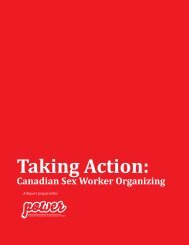THE BASICS: DECRIMINALIZATION OF SEX WORK 101 - Stella
THE BASICS: DECRIMINALIZATION OF SEX WORK 101 - Stella
THE BASICS: DECRIMINALIZATION OF SEX WORK 101 - Stella
- No tags were found...
You also want an ePaper? Increase the reach of your titles
YUMPU automatically turns print PDFs into web optimized ePapers that Google loves.
3WHAT IS <strong>THE</strong> <strong>DECRIMINALIZATION</strong> <strong>OF</strong> <strong>SEX</strong> <strong>WORK</strong>?As part of a movement to recognize our autonomy, self-determinationand need for better working conditions, sex workersaround the world demand the removal of laws and policies thatmake sex work a crime. In countries where there are criminallaws, like Canada, we call for the total decriminalization of sexwork.At its core, decriminalization means the removal of all criminallaws that prohibit selling, buying or facilitating (procuring) sexwork.Decriminalization would reduce the stigma, discrimination anduncertainty that comes with criminality -- allowing us to live andwork in health and safety and without fear of arrest that deprivesus of our freedom and dignity.Sex workers have different needs depending on where we aresituated and how we work. What we want our industry to looklike in a non-criminalized environment will look different forsex workers across the country. Most sex workers are accustomedand skilled at working in an informal and unrecognizedeconomy for many years. Decriminalization could mean a hugeadjustment in working context for sex workers who work in theunderground, whether by choice or necessity. For example, sexworkers have developed knowledge and skills rooted in avoidingpolice and other repressive measures; we have developedways of working around precarious conditions and we have createdother forms of security where police and other mechanismsfail to protect us.Despite the adjustments that come with law reform, decriminalizationwould mean that sex workers, our clients and thirdparties (such as security, partners and receptionists), would notbe breaking criminal laws for working in the sex industry, andwould not be risking arrest.More specifically, the removal of prostitution laws would mean:· We could openly communicate and advertise our services,prices and negotiate limits and boundaries with clients;· We could work alone or with groups in indoor or outdoorspaces without fear of arrest;· We could report abusive or discriminatory hiring and workpractices and fight for access to labour protections that facilitatenegotiating or bargaining power with third parties;· We could work with, work for, or hire people to help us findand book clients, provide security, drive us to work, handleour money and work with others so we are not always isolated;and· It would also mean that our partners and people we live withwould not be at risk of criminalization.For reasons to support the decriminalization of sex work10 Reasons to Fight for the Decriminalization of Sex WorkBy Mensah, M.N. and C. Bruckert. 2011.cybersolidaires.typepad.com/files/10reasons.pdf10 Reasons to Decriminalize Sex WorkPublic Health Program, Open Society Foundations. 2012.www.opensocietyfoundations.org/publications/ten-reasons-decriminalize-sex-work4HOW DOES <strong>DECRIMINALIZATION</strong> HAPPEN?For law reform or decriminalization to happen, sex workers andallies need to engage the legal systems that take apart and rebuildlaws -- the courts or Parliament.Through ParliamentParliamentary committees are sometimes set up to have discussionsabout pressing social issues. Since 1980, Canada hashad three parliamentary reviews and researches of prostitutionlaws and their impact on sex workers: The Special Committee onPornography, otherwise known as the Prostitution Fraser Committee(1982); the Federal/Provincial/Territorial (F/T/P) WorkingGroup on Prostitution (1990); and most recently in 2003,the Subcommittee on Solicitation Law Review (SSLR). These committeesoften make recommendations for changes to prostitutionlaw.Historically, it has been valuable to engage with politicians andlawmakers around policies that negatively affect sex work communities.Through the courtsLaws are also struck down or changed by the Canadian courts –individuals or groups can try to take the government to court tochallenge the usefulness or fairness of a law. Court cases comewith a range of challenges for sex workers. They can be verylegalistic and can result in sex worker rights communities losingpower -- court cases can have limitations and may not be able toaddress all of the issues that we might address at a communitylevel or through social campaigns.Court cases also need to be brought forward by an individual.Finding an individual who can represent the diversity of sexworkers’ experiences is difficult. Also, often the people who docome forward face a lot of public scrutiny as not being representativeor not appealing to the image of sex work that peoplehave. Stigma around sex work means a constant discrediting ofsex workers who do come forward and more importantly, criminaland financial risk!A court challenge can place the focus on the fundamental problemwith prostitution laws: They deny sex workers of our rightsto safety, autonomy and equality. A court challenge allows sexworkers’ experiences to be recognized as legal evidence – wecan demonstrate how the laws actually make it more dangerousfor us to work and live. In this sense, court challenges can addressthe core problem – our human rights violations.There’s no “best way” to approach decriminalization. How weengage with Parliament and the courts, and the role that sexworkers play in framing and articulating the problems, definesthe success of any law reform initiative. That being said, thedominant values and ideologies of the court or Parliament at anygiven time will impact the results of any law reform initiative.Published in April 20132







